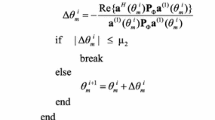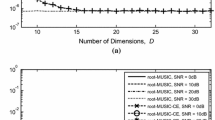Abstract
This letter deals with the residual carrier frequency offset estimation based on minimum output variance (MOV) criterion without devoting training sequence and pilot symbol for uplink interleaved orthogonal frequency division multiple access systems. It has been shown that the performance of MOV estimator is degraded because the effect of noise. In conjunction with unitary transformation and subspace projection techniques, we present an improved unitary MOV (U-SIMOV) estimator to achieve the high accuracy estimate and low complexity for the noisy case. Computer simulations are provided for illustrating the effectiveness of the proposed approaches.



Similar content being viewed by others
References
Nguyen, H. C., de Carvalho, E., & Prasad, R. (2010). Joint estimation timing and frequency offset for uplink OFDMA. Wireless Personal Communications, 52, 119–131.
Zhang, W., & Yin, Q. (2013). Blind maximum likelihood carrier frequency offset estimation for OFDM with multi-antenna receiver. IEEE Transactions on Signal Processing, 61(9), 2295–2307.
Yan, P., Lv, T., Lei, J. S., & He, W. M. (2011). Synchronization of fuzzy high-order Cohen-Grossberg neural networks with reaction-diffusion term and time-varying. Journal of Computational Information Systems, 7(11), 4145–4152.
Cao, Z., Tureli, U., & Yao, Y. D. (2004). Deterministic multiuser carrier frequency offset estimation for interleaved OFDMA uplink. IEEE Transactions on Communications, 52, 1585–1594.
Sun, P. F., & Zhang, L. (2011). A simple iterative carrier frequency synchroniztion technique for OFDMA uplink transmissions. Wireless Communications and Mobile Computing, 11, 121–128.
Lee, J. H., Lee, S., & Bang, K. J. (2007). Carrier frequency offset estimation using ESPRIT for interleaved OFDMA uplink systems. IEEE Transactions on Vehicular Technology, 56(5), 3227–3231.
Miao, R., Xiong, J., Gui, L., & Sun, J. (2009). Iterative approach for multiuser carrier frequency offset estimation in interleaved OFDMA uplink. IEEE Transactions on Consumer Electronics, 55(3), 1039–1044.
Du, R., Wang, J. K., & Liu, F. (2011). Carrier frequency offset estimation using unitary MUSIC for interleaved OFDMA uplink systems. Journal of Information and Computational Science, 8(16), 4309–4316.
Li, F., Sun, J. & Yuan, D. F. Carrier frequency offset estimation for interleaved OFDMA uplink using unitary MUSIC, IEEE 13th international conference on communication technology (ICCT) (pp. 25–28), September 2011.
Du, R. Y., Wang, J. K., Shan, L. Q., & Liu, F. L. (2011). CFO matrix method and performance analysis for carrier frequency offset estimation in OFDMA uplink. ICIC Express Letters, 5(4A), 1137–1144.
Hsieh, H. T., & Wu, W. R. (2011). Blind maximum- likelihood carrier-frequency-offset estimation for interleaved OFDMA uplink systems. IEEE Transactions on Vehicular Technology, 60(1), 160–173.
Yang, F., Li, K. H., & The, K. C. (2004). A carrier frequency offset estimator with minimum output variance for OFDM systems. IEEE Communications Letters, 8(11), 677–679.
Chang, A. C., & Chen, S. W. (2009). Blind carrier frequency offset estimation using an improved minimum output variance approach for synchronous MC-CDMA Systems. Journal of Informatics and Electronics, 3(2), 31–35.
Van de Beek, J. J., & Borjesson, P. O. (1999). A time and frequency synchronization scheme for multiuser OFDM. IEEE Journal on Selected Areas in Communications, 17(11), 1900–1913.
Linebarger, D., DeGroat, R., & Dowling, E. (1994). Efficient direction-finding methods employing forward/backward averaging. IEEE Transactions on Signal Processing, 42(8), 2136–2145.
Pesavento, M., Gershman, A., & Haardt, M. (2000). Unitary root-music with a real-valued eigendecomposition: A theoretical and experimental performance study. IEEE Transactions on Signal Processing, 48(5), 1306–1314.
Haykin, S. (2002). Adaptive filter theory 4th edition. New York: Prentice Hall.
Acknowledgments
The authors would like to thank the anonymous reviewers for their valuable and constructive comments, which helped to improve the presentation of the paper.
Author information
Authors and Affiliations
Corresponding author
Rights and permissions
About this article
Cite this article
Chang, JC. Carrier Frequency Offset Estimation Using Improved Unitary Minimum Output Variance Approaches for Interleaved OFDMA Uplink Systems. Wireless Pers Commun 85, 1081–1091 (2015). https://doi.org/10.1007/s11277-015-2827-y
Published:
Issue Date:
DOI: https://doi.org/10.1007/s11277-015-2827-y




